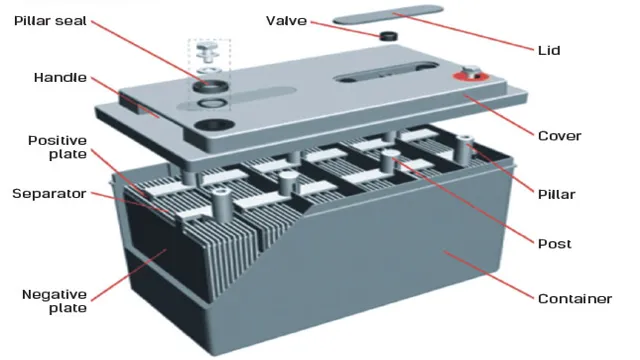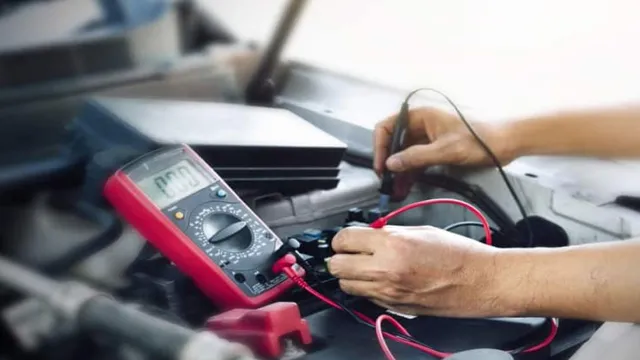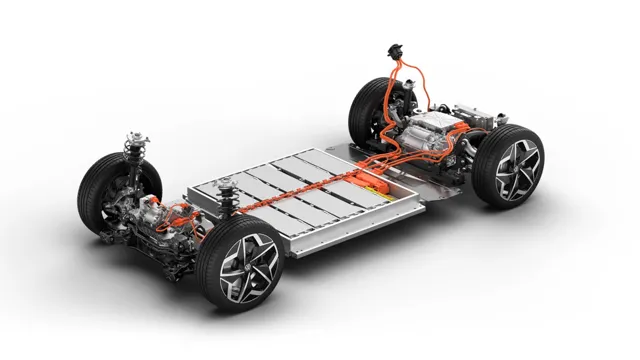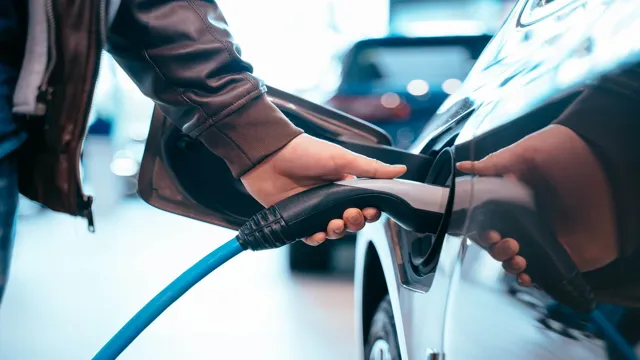Power Up Your Ride: The Ultimate Guide to Car Electrical Work and Battery Maintenance
As a car owner, battery maintenance is one of the key aspects of ensuring your vehicle runs smoothly and efficiently. Battery problems can lead to starting problems, which can be frustrating and time-consuming to rectify. However, with regular maintenance, you can prevent most of these issues from occurring.
In this blog post, we’ll be providing you with some tips for maintaining your car battery and extending its lifespan. Whether you’re a first-time car owner or a seasoned driver, these tips will come in handy. So, grab a cup of coffee, sit back, and let’s dive in!
Understand Your Car Battery
When it comes to car electrical work, one of the most important components is the car battery. Without it, your vehicle wouldn’t be able to start, and all the electrical features wouldn’t work. That’s why understanding your car battery is crucial if you want to avoid any unexpected breakdowns or costly mistakes.
First, it’s essential to know the type of battery your car uses, as this will affect its lifespan and performance. Generally, there are two types of batteries: lead-acid and lithium-ion. Lead-acid batteries are more traditional and affordable, while lithium-ion batteries are more efficient and have longer lifespans.
Additionally, you should keep an eye on the battery’s age, as all batteries have a limited lifespan that usually ranges from 3 to 5 years. Regular maintenance, such as checking the fluid levels and keeping the battery clean, can help prolong its lifespan. Lastly, it’s important to know when it’s time to replace the battery, as a weak or dead battery can lead to other electrical issues in your car.
With just a little understanding and maintenance, your car battery can last longer and keep your car running smoothly.
Be Familiar with Your Car’s Electrical System
Understanding your car’s electrical system is crucial for keeping your vehicle running smoothly and avoiding breakdowns. One of the most important components of this system is the car battery. This device stores and releases electrical charge to power the various electronic components in your car, like the ignition system, lights, and stereo.
To keep your battery in good condition, it’s important to check its voltage regularly and replace it when it starts to lose charge. You can also prolong your battery’s life by turning off electronic devices when your car is not in use, avoiding extreme temperatures, and using a battery charger when needed. Understanding your car battery can help you avoid issues on the road and keep your vehicle reliable for years to come.

Know the Signs of a Dead Battery
Having a dead car battery can be a headache, especially when you’re in a hurry. Understanding your car battery is a significant step to ensure you don’t get stranded in the middle of nowhere. A car battery is responsible for providing power to start your engine and run various electrical components, such as headlights, radio, and air conditioning.
Knowing when a car battery is dying is essential, and there are a few signs to look for, such as a slow turning engine, dimmed headlights, and clicking sounds. It’s crucial to address these issues as soon as possible because a dead battery will leave you with a car that won’t start. Moreover, temperature changes and excessive idling can also reduce the lifespan of your car battery.
Therefore, it’s advisable to be mindful of these factors and have your battery checked regularly to avoid facing any inconveniences on the road.
Maintenance Tips to Keep Your Battery Running Smoothly
Car electrical work battery is one of the essential components of a vehicle that needs proper maintenance. Here are some tips to help you keep your car battery running smoothly. First, keep your battery terminals clean from dirt, dust, and rust using a wire brush and a terminal cleaner solution.
Second, regularly check the battery water and maintain a proper water level. Third, avoid draining your battery by turning off all the electronic devices when the engine is off. Fourth, keep your vehicle in a garage or a shaded area to avoid exposing the battery to extreme heat or cold temperatures.
Fifth, inspect your battery for leaks and cracks, and if you find any, replace the battery immediately to avoid any future damage. By following these tips, you can ensure the longevity and performance of your car’s electrical work battery, and prevent any unexpected dead battery situations on the road.
Regularly Check Battery Fluid Levels
Regularly checking your battery’s fluid levels is an essential maintenance tip that can ensure your battery runs smoothly. Over time, the electrolyte fluid in your battery can evaporate, leaving your battery with inadequate fluid levels. This can lead to reduced performance and even complete failure of your battery.
By checking the fluid levels regularly, you can keep your battery in good working condition and extend its lifespan. Make sure to check the fluid levels every few months and add distilled water if necessary. Don’t forget to wear gloves and eye protection when handling battery acid, as it can be hazardous if it comes into contact with your skin or eyes.
By following this simple maintenance tip, you can ensure your battery is always charged and ready to go when you need it. So, take a few minutes to check your battery’s fluid levels today and keep it running like a well-oiled machine!
Clean Battery Terminals and Connectors
If you want to keep your battery running smoothly for a long time, one of the essential maintenance tips is ensuring clean terminals and connectors. Over time, corrosion and dirt buildup can accumulate on the battery posts and cables, causing a weak connection and hindering the current flow. To clean the battery terminals, first, ensure the engine is off.
Begin by removing the negative (-) cable clamp before the positive (+) clamp and carefully lifting the battery from the tray. Use a stiff wire brush or a battery cleaning tool to scrub the corrosion and dirt build-up from the posts and connectors. For tough corrosion, you can use baking soda mixed with water to create a paste and apply it on the affected areas.
After scrubbing, rinse the terminals and connectors with clean water and dry them with a clean rag. Don’t forget to clean the cable ends as well before reattaching them to the battery, starting with the positive clamp then the negative one. Regularly checking and cleaning the battery terminals and connectors can ensure your battery is working correctly, and it can prevent unexpected failures.
So, if you notice any signs of corrosion or dirt buildup, such as rust, green and white powdery substance or slow cranking, it’s time to perform some maintenance work on your battery.
Monitor the Charge Level
One of the easiest ways to maintain your battery is by monitoring its charge level. Most batteries nowadays have a built-in indicator that shows how much charge is left. It’s important to pay attention to this so that you can recharge it before it gets too low.
If you let your battery go completely dead, it can cause permanent damage to it. Additionally, overcharging your battery can also cause damage, so make sure to unplug it when it’s fully charged. By keeping an eye on your battery’s charge level, you’ll be able to keep it running smoothly for longer.
So, make it a habit to check your battery regularly and recharge it when needed, your battery will thank you for it!
When to Seek Professional Help
If you are experiencing issues with your car’s electrical work, specifically with the battery, it may be time to seek professional help. While changing a car battery is a simple task that many people can handle on their own, other problems with the car’s electrical system may require the expertise of a mechanic. If you notice that your car’s battery is frequently dying, the headlights are dim or flickering, or the car is making strange noises, it is time to have a professional test the battery and the electrical system.
Additionally, if you are not familiar with electrical work, trying to fix the problem yourself could result in further damage to your car or even harm to yourself. So, when it comes to car electrical work involving the battery, it is always better to be safe than sorry and seek the help of a professional mechanic.
Signs That Your Battery Needs to be Replaced
If you’ve noticed that your car is struggling to start or your headlights are dimming, it might be a sign that your battery needs to be replaced. But when should you seek professional help? If you’re not comfortable working with car batteries, it’s always best to bring your car to a professional mechanic. They can test your battery and determine if it needs to be replaced or if there’s another issue that’s causing the problem.
Plus, attempting to replace a battery yourself can be dangerous if you don’t know what you’re doing. A professional can ensure that the new battery is installed safely and properly. Don’t risk damaging your car or injuring yourself – leave it to the experts.
How to Choose the Right Replacement Battery
When it comes to replacing your battery, it can be tempting to try and do it yourself to save money. However, it’s important to know when to seek professional help. If you’re unsure about your ability to safely remove and install the battery, or if you’re not sure what type of battery you need, it’s best to leave it to the experts.
A professional can ensure that the battery is installed properly and can also help you select the right replacement battery for your vehicle. Additionally, attempting to replace the battery yourself could potentially damage your vehicle or even harm you. So, if you’re not confident in your skills or don’t have the proper tools, it’s always better to err on the side of caution and seek professional assistance.
Remember, it’s better to pay a little extra for peace of mind than to risk a costly mistake.
Final Thoughts: Keep Your Car Going With Proper Battery Care
Proper battery care is essential for your car’s electrical work and overall longevity. A dead battery can leave you stranded, and constantly replacing batteries can be costly. To keep your battery in good condition, avoid overworking it by turning off all accessories when the engine is off.
Regularly check and clean the battery terminals to prevent corrosion. If your car will be sitting idle for an extended period, use a trickle charger to maintain the battery’s charge. Lastly, if your battery is over three years old, it may be time to get it replaced.
Taking these simple steps can help prevent car breakdowns and ensure that your car’s electrical system remains in good working condition. Remember, a little bit of maintenance goes a long way, so take proper care of your battery to keep your car rolling smoothly on the road.
Conclusion
In conclusion, car electrical work and batteries can be a shocking topic for those unfamiliar with the inner workings of their vehicle. But fear not, by understanding and maintaining your battery, you can spark the life back into your car and keep it running smoothly. So don’t be negative, embrace the positive charge and keep on cruising!”
FAQs
How does the car’s electrical system work?
The car’s electrical system consists of the battery, starter, alternator, and various electrical components that power the engine, lights, and other systems in the car. The battery provides power to start the engine and provides reserve power for electrical systems when the engine is not running.
How do I know if my car’s battery is dead?
If your car won’t start or the lights and electrical components are not working, it may be a sign that the battery is dead. You can test the battery with a multimeter to see if it has sufficient charge, or take the car to a mechanic for a professional diagnosis.
What causes a car battery to die quickly?
A car battery can die quickly due to a number of factors, including temperature extremes, leaving lights or other electrical components on when the engine is not running, a faulty charging system, or a parasitic drain on the battery’s power.
How often should I have my car’s charging system inspected?
It is recommended that you have your car’s charging system inspected at least once a year, or more frequently if you notice any issues such as dimming headlights or slow cranking when starting the engine. A professional inspection can diagnose any problems with the battery, alternator, or other electrical components in your car.




